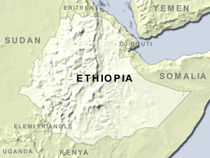-
(单词翻译:双击或拖选)
Nairobi
13 June 2007
The Ethiopian government today hit back at critics who say it is using the courts to harass1 journalists and get revenge against the opposition2. Two journalists face a possible death sentence for trying to "overthrow3 constitutional rule". Katy Migiro has more on the story for VOA.
 |
Ethiopian government spokesman Bereket Simon says the courts were right to convict the journalists because they were calling for the violent overthrow of the government.
"Every citizen has the right to express himself or herself in a free way and this includes criticizing, dissenting7 with the positions of the government," he said. "On the other hand, it is illegal in the Ethiopian constitution to instigate8 violence and call people to rise up in arms. You can look into any publication of these newspapers. They were calling people to rise up in arms day in day out."
The head of the Africa desk at Reporters Without Borders, Leonard Vincent, disagrees.
"They were saying that people should have strong demands to the government since they believed the elections were stolen," he said. "So they wrote different things. But nothing in the court, in the trial, nothing proves that they called for an uprising and a violent uprising. They said that the people should have demands and that they should show their demands and their strength in the streets. That is true. But that is not a crime. That is not high treason."
The stories under scrutiny9 relate to the Ethiopian government's handling of disputed parliamentary elections in 2005. Almost 200 people died as the government cracked down on mass demonstrations10 complaining of fraud and vote rigging.
On Monday, a court found 38 senior opposition leaders guilty of charges related to the same period of protest in 2005.
Reporters Without Borders says the Ethiopian government should solve its problems with the opposition through political dialogue, not through the courts.
Many of those convicted did not defend themselves in court because they refused to recognize its legitimacy11.
 收听单词发音
收听单词发音
1
harass

|
|
| vt.使烦恼,折磨,骚扰 | |
参考例句: |
|
|
|
2
opposition

|
|
| n.反对,敌对 | |
参考例句: |
|
|
|
3
overthrow

|
|
| v.推翻,打倒,颠覆;n.推翻,瓦解,颠覆 | |
参考例句: |
|
|
|
4
imprisonment

|
|
| n.关押,监禁,坐牢 | |
参考例句: |
|
|
|
5
conspiring

|
|
| 密谋( conspire的现在分词 ); 搞阴谋; (事件等)巧合; 共同导致 | |
参考例句: |
|
|
|
6
inciting

|
|
| 刺激的,煽动的 | |
参考例句: |
|
|
|
7
dissenting

|
|
| adj.不同意的 | |
参考例句: |
|
|
|
8
instigate

|
|
| v.教唆,怂恿,煽动 | |
参考例句: |
|
|
|
9
scrutiny

|
|
| n.详细检查,仔细观察 | |
参考例句: |
|
|
|
10
demonstrations

|
|
| 证明( demonstration的名词复数 ); 表明; 表达; 游行示威 | |
参考例句: |
|
|
|
11
legitimacy

|
|
| n.合法,正当 | |
参考例句: |
|
|
|















